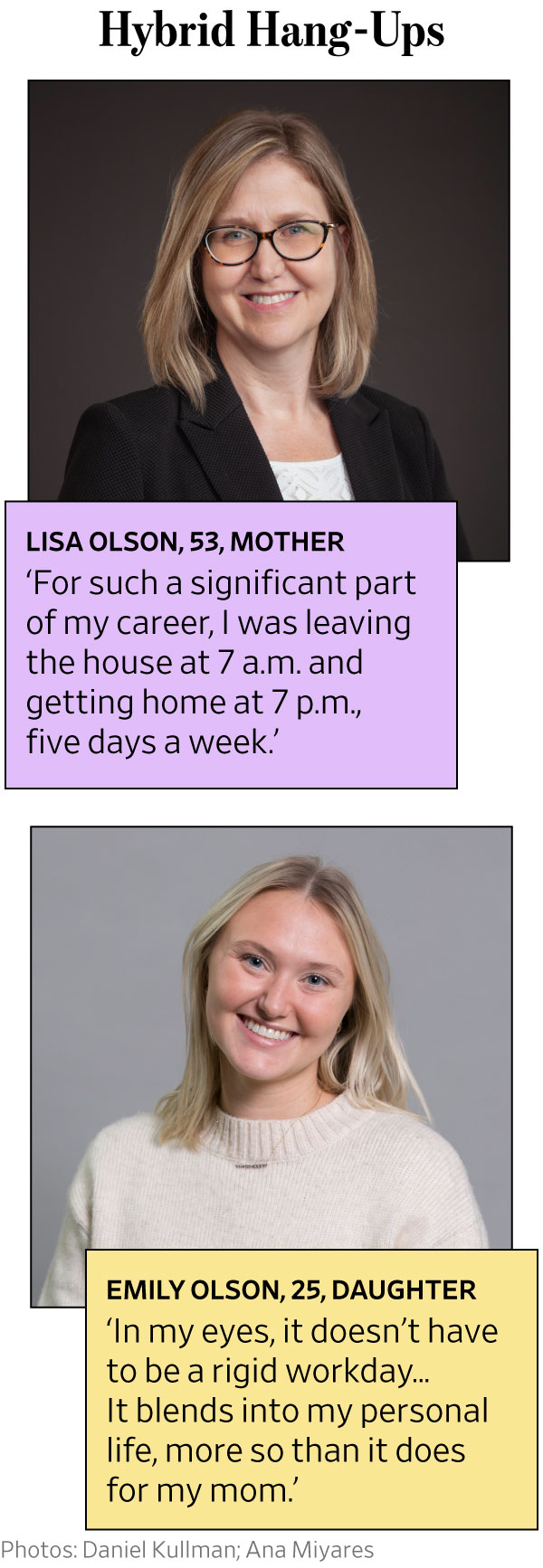The Big Family Fight Is Over How to Work. ‘They Think I’m Insane.’
Generational debates about work may be brewing in the office, but they’re often louder on the home front
Hybrid work. Hustle culture. Work-life balance.
Tensions over how to work don’t just permeate offices these days. They’re on full display within families.
“They think I’m insane,” Lisa Olson, 53, said of her children when she tells them she skipped lunch during the workday.
Her 25-year-old daughter, Emily Olson, tends to fit her job in advertising around her life, sometimes taking a midday break but also logging on after-hours if there’s work to be done. She thinks her mom struggles to make time for herself.
Like with the Olsons, many of these debates break along generational lines. Many parents in their 50s and 60s built careers in pay-your-dues work environments where 40 hours was the minimum spent in an office each week. They had clear-cut templates for getting ahead.
Their children, in contrast, joined the labor force over the past decade, as the gig economy took off, a pandemic upended 22 million jobs and millions of people embraced working from home. Technologies such as AI are scrambling their careers even more.
These debates about work are often more pointed, and personal, at home than on the job. Parents and their adult children say these conversations are often meaningful in navigating today’s multigenerational workforce.

“These are people who’ve known you all your life—you hope they understand what really matters to you,” said Megan Gerhardt, a management professor at Miami University’s Farmer School of Business and the author of a book about intergenerational workforces.
Emily has worked mostly remotely since graduating from college in 2020. One benefit is that she can integrate errands into her workday. Her mother, who works in financial services, urges her to go into the office.
“When you’re remote, you hop on a Teams call, and you talk about the issue at hand—and you don’t necessarily have extra time in that meeting to chat,” Lisa said.
Emily said that when she does commute to work, she often interacts with co-workers virtually since not all of her team lives in Chicago, where she’s based.
As long as she does good work and is responsive, working set hours in a set place isn’t important to her, she said. When a call was unexpectedly rescheduled to a Friday afternoon, when work is usually winding down, she logged on from the hair salon while getting highlights.
“It doesn’t have to be a rigid workday,” said Emily, who often works more than 40 hours each week.
Lisa, on the other hand, said she spent much of her career leaving for work at 7 a.m., and returning at 7 p.m., five days a week. “In my world, work is a completely separate item from my personal life,” she said.

Kristin Ned, 48, has logged long hours over her career in human resources, ready to respond to emergencies. Her 28-year-old daughter, Maaliyah Papillion, gives priority to rest when she’s not on the clock.
“She and I are not on the same page when it comes to what it takes to get something done,” said Ned, who lives in Lake Charles, La. “I know not everything can happen between 8 a.m. and 5 p.m.”
Papillion started an executive-assistant job this summer in New Orleans. A priority was professional boundaries, especially since she was embarking on a master’s program and had less free time.
“If work is over, work is over,” she said.
One Sunday night, Papillion got a work call. “Can it wait until tomorrow?” she replied. Later, she consulted her mom.
No one wants to make a work call on a Sunday night, Ned said, so it must have been important. Papillion said she now sees that little gestures go a long way, especially when building professional relationships.
Ned said she’s also learned from Papillion’s approach to work, such as when Ned’s company held a back-to-school campaign allowing for more work flexibility as parents adjusted to new school drop-off routines.
“We tried to make it as easy as possible,” she said.

Kendrick Hering, 24, has been patching together temporary gigs in landscaping and fixing up rental properties while he tries to launch his own business as a digital artist. His dad, Doug Hering, wants him to apply for more steady work.
Kendrick lives at home in Colorado Springs, Colo., and pays rent to his parents. He has been applying for more full- and part-time work for months, but with no luck. He also doubts full-time work would come with the job security and benefits that would make all the hustling he’s doing now worth it.
“To actually even find out about a job that I’m probably, just statistically speaking, not going to get, I have to do an exorbitant amount of research,” Kendrick said.
Doug Hering, a 63-year-old financial planner, has recommended his son apply to several jobs each day. He also has suggested he make business cards and perhaps enlist a life or business coach.
“You can’t sit back and do some digital advertising and hope that the floodgates will open,” said Doug, who took Kendrick to a networking event this month.

Lisbeth Darsh, a 57-year-old marketer based in Seattle, said her kids often encourage her to vie for promotions, so that her pay and title reflect her expertise. Her son, Justas Rodarte, 26, said his mum’s skills in writing to engage an audience are hard to match and she is better than he is at social media.
“My son is good at reminding me that there’s great value in what I do, and I owe it to myself to get that value,” Darsh said.
She’s not alone in taking advice from younger generations. About three-quarters of nearly 7,000 workers surveyed worldwide this summer said 20-something co-workers had influenced their attitudes toward issues such as work-life boundaries, fair pay and self-advocacy, according to Edelman, the public-relations firm that conducted the survey.
In the past, employers haven’t fully recognised Darsh’s skills, her son said, but this summer she won a promotion to become a director.
Now, his mum has a position that “fits her skills really well,” said Rodarte, who is pursuing a Ph.D. in immunology. “It’s the sort of thing that I wish I’ll be able to achieve.”
 Copyright 2020, Dow Jones & Company, Inc. All Rights Reserved Worldwide. LEARN MORE
Copyright 2020, Dow Jones & Company, Inc. All Rights Reserved Worldwide. LEARN MORE
This stylish family home combines a classic palette and finishes with a flexible floorplan
Just 55 minutes from Sydney, make this your creative getaway located in the majestic Hawkesbury region.
As Paris makes its final preparations for the Olympic games, its residents are busy with their own—packing their suitcases, confirming their reservations, and getting out of town.
Worried about the hordes of crowds and overall chaos the Olympics could bring, Parisians are fleeing the city in droves and inundating resort cities around the country. Hotels and holiday rentals in some of France’s most popular vacation destinations—from the French Riviera in the south to the beaches of Normandy in the north—say they are expecting massive crowds this year in advance of the Olympics. The games will run from July 26-Aug. 1.
“It’s already a major holiday season for us, and beyond that, we have the Olympics,” says Stéphane Personeni, general manager of the Lily of the Valley hotel in Saint Tropez. “People began booking early this year.”
Personeni’s hotel typically has no issues filling its rooms each summer—by May of each year, the luxury hotel typically finds itself completely booked out for the months of July and August. But this year, the 53-room hotel began filling up for summer reservations in February.
“We told our regular guests that everything—hotels, apartments, villas—are going to be hard to find this summer,” Personeni says. His neighbours around Saint Tropez say they’re similarly booked up.
As of March, the online marketplace Gens de Confiance (“Trusted People”), saw a 50% increase in reservations from Parisians seeking vacation rentals outside the capital during the Olympics.
Already, August is a popular vacation time for the French. With a minimum of five weeks of vacation mandated by law, many decide to take the entire month off, renting out villas in beachside destinations for longer periods.
But beyond the typical August travel, the Olympics are having a real impact, says Bertille Marchal, a spokesperson for Gens de Confiance.
“We’ve seen nearly three times more reservations for the dates of the Olympics than the following two weeks,” Marchal says. “The increase is definitely linked to the Olympic Games.”

Getty Images
According to the site, the most sought-out vacation destinations are Morbihan and Loire-Atlantique, a seaside region in the northwest; le Var, a coastal area within the southeast of France along the Côte d’Azur; and the island of Corsica in the Mediterranean.
Meanwhile, the Olympics haven’t necessarily been a boon to foreign tourism in the country. Many tourists who might have otherwise come to France are avoiding it this year in favour of other European capitals. In Paris, demand for stays at high-end hotels has collapsed, with bookings down 50% in July compared to last year, according to UMIH Prestige, which represents hotels charging at least €800 ($865) a night for rooms.
Earlier this year, high-end restaurants and concierges said the Olympics might even be an opportunity to score a hard-get-seat at the city’s fine dining.
In the Occitanie region in southwest France, the overall number of reservations this summer hasn’t changed much from last year, says Vincent Gare, president of the regional tourism committee there.
“But looking further at the numbers, we do see an increase in the clientele coming from the Paris region,” Gare told Le Figaro, noting that the increase in reservations has fallen directly on the dates of the Olympic games.
Michel Barré, a retiree living in Paris’s Le Marais neighbourhood, is one of those opting for the beach rather than the opening ceremony. In January, he booked a stay in Normandy for two weeks.
“Even though it’s a major European capital, Paris is still a small city—it’s a massive effort to host all of these events,” Barré says. “The Olympics are going to be a mess.”
More than anything, he just wants some calm after an event-filled summer in Paris, which just before the Olympics experienced the drama of a snap election called by Macron.
“It’s been a hectic summer here,” he says.

AFP via Getty Images
Parisians—Barré included—feel that the city, by over-catering to its tourists, is driving out many residents.
Parts of the Seine—usually one of the most popular summertime hangout spots —have been closed off for weeks as the city installs bleachers and Olympics signage. In certain neighbourhoods, residents will need to scan a QR code with police to access their own apartments. And from the Olympics to Sept. 8, Paris is nearly doubling the price of transit tickets from €2.15 to €4 per ride.
The city’s clear willingness to capitalise on its tourists has motivated some residents to do the same. In March, the number of active Airbnb listings in Paris reached an all-time high as hosts rushed to list their apartments. Listings grew 40% from the same time last year, according to the company.
With their regular clients taking off, Parisian restaurants and merchants are complaining that business is down.
“Are there any Parisians left in Paris?” Alaine Fontaine, president of the restaurant industry association, told the radio station Franceinfo on Sunday. “For the last three weeks, there haven’t been any here.”
Still, for all the talk of those leaving, there are plenty who have decided to stick around.
Jay Swanson, an American expat and YouTuber, can’t imagine leaving during the Olympics—he secured his tickets to see ping pong and volleyball last year. He’s also less concerned about the crowds and road closures than others, having just put together a series of videos explaining how to navigate Paris during the games.
“It’s been 100 years since the Games came to Paris; when else will we get a chance to host the world like this?” Swanson says. “So many Parisians are leaving and tourism is down, so not only will it be quiet but the only people left will be here for a party.”
This stylish family home combines a classic palette and finishes with a flexible floorplan
Just 55 minutes from Sydney, make this your creative getaway located in the majestic Hawkesbury region.






















